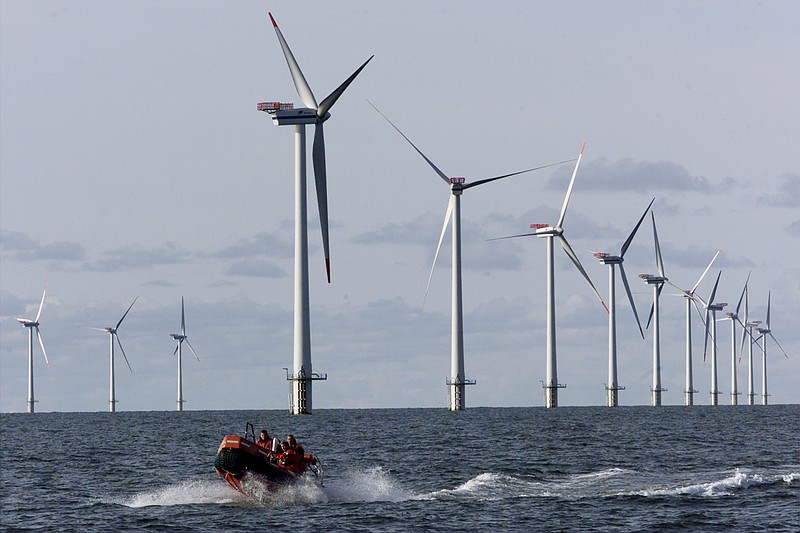Just a day after saying it will ban commercial oil drilling off the Atlantic Coast, the Obama administration dedicated more than 125 square miles off Long Island in the Atlantic for the development of commercial wind energy.
The hypocrisy could be heard up and down the more than 2,000 miles of Atlantic coastline.
Interior Secretary Sally Jewell was the administration point person sent out to make the case. The oil drilling decision, she said on Tuesday, "protects the Atlantic for future generations. Now is not the time to start leasing off the Atlantic Coast."
"Today's milestone [creating a wind farm]," Jewell said on Wednesday, "marks another important step in the president's strategy to tap clean, renewable energy from the nation's vast wind and solar resources."
The administration, after seven years, is not fooling anyone. The president's stated aim even before he was elected in 2008 was to reduce the use of cheaper oil as an energy source and promote the use of more expensive, less reliable green energy sources.
Jewell's blather about protecting the ocean for future generations was good for only a day.
Since both oil and wind involve private companies doing the build-out to deliver the energy, it's another example of the administration choosing winners and losers. Especially for a source that, according to the American Wind Energy Association, provides only 4.7 percent of U.S. electricity.
The wind farm, 11 miles off the coast and one of more than a dozen such offshore leases the Obama administration has opened up, is expected to include up to 200 turbines generating about 700 megawatts of energy said to be capable of powering about 245,000 homes. The turbines are expected to cost between $2 billion and $4 billion.
Curiously, now that the area has been dedicated for the wind farm, an environmental assessment is to be completed to determine the potential damage from the turbines. Opposition to previous Atlantic wind farms has centered not only on their cost - or the need for federal subsidies - but also on, among other things, potential damage to marine life, disruption of fishing grounds, noise and radar interference.
However, opponents needed no environmental assessment to weigh in on the oil wells, which could bring in a portion of what the Interior Department estimates is about 2.8 billion barrels of recoverable oil and 26.4 trillion cubic feet of natural gas on the Atlantic's outer continental shelf.
"President Obama has taken a giant step for our oceans, for our coastlines and for mitigating climate change," said Jacqueline Savitz, vice president of Oceana, an environmental group.
Proponents of drilling had said the exploration for oil would be done more safely than ever, with lessons applied from the 2010 BP oil spill in the Gulf of Mexico.
The decision not to allow drilling, said Jack Gerard, president and CEO of the American Petroleum Institute, "appeases extremists who seek to stop oil and natural gas production." He said it ultimately would increase energy costs for Americans, close the door on efforts to create jobs, and lower energy security.
The Obama administration's conclusion reverses one it made just over a year ago when it offered a plan that would have opened up sites more than 50 miles off Georgia, North Carolina, South Carolina and Virginia to drilling no earlier than 2021.
The Republican governors of North Carolina and South Carolina and the Democratic governor of Virginia, as well as a bipartisan group of senators from the affected states, all had supported the drilling plan.
Among those is Sen. Tim Kaine, D-Va., thought to be high on the list of vice presidential possibilities if Hillary Clinton is the Democratic presidential nominee. Clinton hasn't taken a position on Obama's decision - she's undoubtedly waiting to see where it might help her or hurt her - but Kaine, a member of the Senate Armed Services Committee, was upset some of the opposition to drilling had come from the Pentagon, which hadn't made a peep when the proposal was floated last year.
The Pentagon, he said, "has been relatively quiet during this public debate and has never shared their objections with me before."
Virginia's governor, Terry McAuliffe, who also favors Atlantic exploration, was Bill Clinton's top fundraiser in an administration that was pro-drilling. So it will be interesting to see where Hillary Clinton, who has had to lean toward climate extremists in an effort to capture the Democratic base, finally lands on the issue.
The United States, in attempting to become a more energy-independent country, has made great strides in the last decade with fracking that allowed oil prices to fall and the country to increase its reserves. But it still needs to maintain an all-of-the-above energy policy until such time, or if, green energies become more cost-efficient. Barring oil drilling in the Atlantic for the near future and promoting costly wind energy is a step backward from that end.
